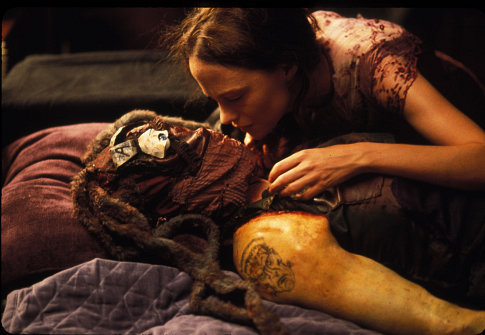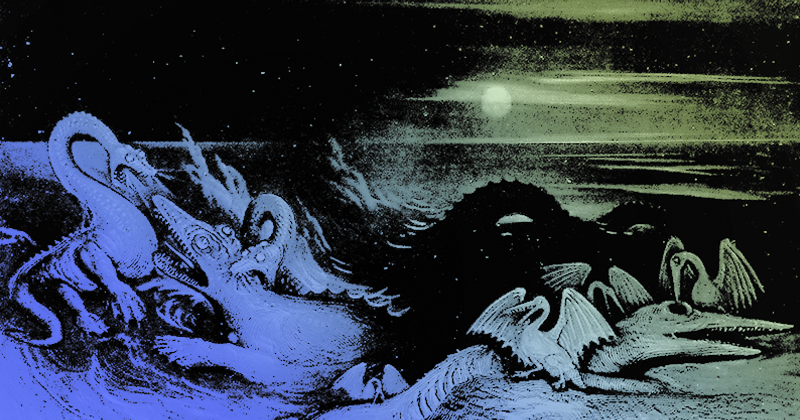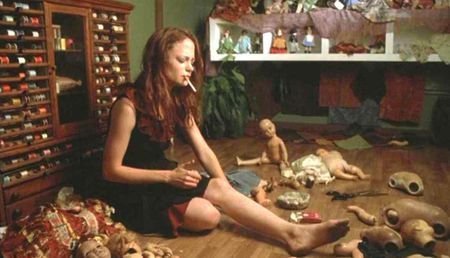Monstrous Longing in Two Queer ‘Frankenstein’ Adaptations [Abibliophobia]

Welcome to Abibliophobia, the monthly column where Katelyn Nelson digs into the connections and influences buried deep within the world of the written word and its far-reaching tendrils across media. Focused broadly on horror and the ways it sneaks among the pages, each month will explore a new book or series and its impact on our culture, through the lens of history, the relationship between film and literature, and what varying adaptations have to say about how we understand and recreate stories. So, curl up by the fire and crack those dusty covers open. We have a lot of exploring to do.
There’s something carnal about want. The desire to connect and belong is one of our most basic human needs and instincts. Even if the world we want into does not want us, we rebel with everything in ourselves to carve a space, demanding to be heard and seen. This urge toward making our mark can be dangerous, though. We become feverish and frenzied. A monster of our own making, born from a mix of societal scorn and personal desperation.
The tension of wanting into a society that wishes to shut us out for being Other is one of the hallmark explorations of media across the board, but perhaps nowhere better than in the hands of horror and science fiction’s goth-mother, Mary Shelley herself. All the best Frankenstein adaptations have at their core an all-consuming hunger. A need that takes over and edges out all reason. That which turns the social outsider into a monster, it says, is the prideful knowledge that we deserve the life and opportunities freely given to our more accepted counterparts.
Also Read: Reviving Frankenstein’s Monster in the Midst of Mass Death
There are two rather exceptional Frankenstein interpretations that latch onto this last point and morph it into something unnaturally beautiful. They center on queer women who are unafraid to be even the most unnerving or abrasive versions of themselves. One hungers primarily for connection, the other for recognition. Both hunger for love. Both use their own knowledge and desire to cross the boundary of social acceptance and create what they want for themselves, no matter the cost. They accept the monsters they make, loving them because—or in spite of—their monstrosity. Interestingly, they also seem to approach the subject matter from opposing yet harmonious angles.
The first work of note, C.E. McGill’s debut novel, Our Hideous Progeny, was released just two months ago. It’s 1853 in London, and Mary Sutherland wants nothing more than to be recognized for her contributions to the male-dominated field of paleontology. But, she’s buried under the weight of her husband’s name, ego, and gambling addiction. When she finds notes from her mysterious, elusive uncle Victor detailing scientific experiments bordering on the blasphemous, she and her husband launch a plan to recover his tenuous reputation and make an undisputed name for themselves now and forever. They also want to disprove the theory of another, much more well-respected scientist against whom Mary’s husband holds a deep and personal grudge. It quickly becomes apparent, however, that Mary has a much stronger moral compass than either of her male counterparts who journey to bring a long-dead prehistoric creature back to life.

Also Read: ‘Stigmata’: A Criminally Underrated Religious Horror Film
Perhaps it is no surprise that Progeny’s ultimate catalyst is the result of the volatile mix between Mary’s hunger for professional recognition and her husband’s petty personal spite. The two are Victor Frankenstein split right down the middle. On one side, scientific exploration and a desire for control over the ungraspable in a world that seems hellbent on smothering certain voices. On the other, the need to be not just successful but correct in the face of personal enemies, even if it drives you mad.
Just as every Frankenstein adaptation worth its salt is at least a little bit queer and a little bit disabled, so too does it bring forth questions of parentage and family-rearing. Progeny brings the usual ideas of fatal family to the core but turns them just so through its feminist lens. The novel is, above all, the story of a woman who refuses to apologize for her desires, no matter what form they take. She has lost as Victor loses, and as Shelley herself did. But Mary refuses to let those around her—primarily her husband—tell her that her pursuit in the creation of her Creature is purely to heal or replace the wound left in her from the loss of her own child.
Also Read: How The Good Priest Trope Helped Me Unpack My Religious Trauma
It is so much more complex than that for her, and through everything, she is perhaps the only one to keep her moral wits about her in the wake of their experimentation. Mary wants recognition for discovering not only the method of creation but also the true nature of the prehistoric animal she and her husband have brought back from the dead, but not at the expense of its suffering. Where the rest see proof and profit, Mary sees the beauty she always did in the bones of the past.
What sets her apart from both her husband and her infamous uncle is her ability to see into the core of her creation to its potential. Its spark. The life behind its eyes that begs for understanding with the same desperation as she did in her youth and does every day. She has the mind of a scientist, but the heart of an unapologetic woman who has seen the kindness and cruelty of the world in equal measure—she has long since decided which side of the field she wanted to play on. Even amid her own personal turmoil, she knows the best and happiest it will ever be is free. From its freedom, she draws strength for her own truths.
Where Mary twists the scientist angle on its head, Lucky McKee’s May feels more closely aligned to reimagining the passionate hunger of Shelley’s Creature. There is nothing monstrous about Angela Bettis’ titular character, not exactly. She is a social outcast thanks to a lazy eye and her mother’s desperation for the creation and maintenance of perfection. Her ability to interact in the way most common with her peers is hindered, but she does not let it stop her from being herself.
Also Read: It’s Alive!: Horror’s 9 Best Frankenstein-Inspired Films & TV Episodes

May is a quintessential Weird Girl, not because of her disability, but because she doesn’t shy away from her unusual interests. A sheltered life being told that perfection should be boxed away and untouched, but also that if you cannot meet friends, you can make them just as easily yourself, has twisted her perception of the world into something unusual though, predominantly, harmless. At least at first. Much like the original Creature, what sets May over the edge and onto her rampage equivalent is when she is shunned by the people she thought closest to her. People who gave off an air of being outsiders like her but who were, ultimately, almost as vanilla as they come. Being edgy for performance’s sake rather than dark because it was what felt comfortable to them, as it does to her.
The people she surrounds herself with when she decides to open up have an idea of her in their heads. When she breaks from that pre-formed notion, they don’t know how to act. In the case of Adam (Jeremy Sisto), who May latches onto thanks to his perfect hands and horror-film-bro attitude, he likely interprets her as an easy score, desperate for any crumb of affection he might deign to give. What he gets instead is a woman who knows what she wants and likes, and who is leagues out of his depth. One personal confrontation with her and his love for things dark and bloody looks like child’s play.
Also Read: ‘birth/rebirth’: A Pitch-Perfect Modern Re-telling of Frankenstein [Sundance 2023 Review]
On the other side, you have Polly (Anna Faris), who is more sexually open and provocative but interprets May as a shy, awkward girl who can’t see her way out of her own shell. For Polly, May is likely closer to a toy, a passing fling on the way to finding her next big conquest. In this, there is some interrogation, perhaps, to be done about the portrayal of queer women as sexually promiscuous.
But there is enough range in McKee’s characters and enough heart in Faris’ portrayal of Polly that it’s possible to posit that Polly did not interpret their connection and severance as damaging. She truly does regard May as a friend probably more than any other character in the film, but she never thought May’s feelings toward her were any deeper than her own. For that, then, what happens to Polly’s girl-after speaks more to May’s sense of impulse than her sense of justice.
Also Read: ‘Mary Shelley’s Frankenstein’ Is Given New Life in 4K
What makes May a unique monster is her twisting of what being a monster means. In any other film, the strangeness May exhibits in everyday life would be enough to mark her as the villain with hardly the blink of an eye. But here, Bettis’ performance dances the line of vulnerability and darkness so well that we feel for her even in her oddest moments. It also sets us up for the twist of knowing she’s flipped when she starts acting like everyone else.
She takes off her glasses, lowers the tone of her voice, and walks in a slightly straighter posture, and suddenly she is the bringer of blood to the Halloween party. A studied, perfect inversion of that which is usually thought to be monstrous. Normalcy and beauty standards meet to hide deadly intent. And yet even here, really, we sympathize with her just like we do with Shelley’s Creature.
Also Read: 5 Scariest Moments in ‘The Exorcist’
May’s position as Creation (by circumstance) and Creator (by choice) makes McKee’s film a unique Frankenstein interpretation because it could be read as positing the idea of “what would happen if the Creature got the chance to make his own companion?” All May wants is a friend. But she also wants to retain the parts of people she finds perfect. So, what better way than to make the perfect friend from perfect parts? This idea of only taking the perfect bits makes May’s relationship with her own Creature especially poignant when she comes to the realization that the one thing it’s missing is something only she can provide.
While it is left up to interpretation thanks to some tricky camera work (or me simply losing track of which is which), I choose to believe that the eye she gifts her Creation is her lazy eye. The origin of her suffering and ostracization is made better when given with love to an otherwise perfect being. Does this mean that May has thought this whole time, despite everything, that what makes her unique is worthy of being perceived as beautiful the way she thinks all other of her Creature’s parts are? Given the bittersweet tone of the film from opening to ending, I would argue for the possibility. And what would that mean?
May and Progeny both take Shelley’s Frankenstein and ask, what if our longings are fulfilled? What if we take the power of satiating our hunger into our own hands, without losing ourselves? What if we don’t take “no” for an answer?
Categorized:Editorials

